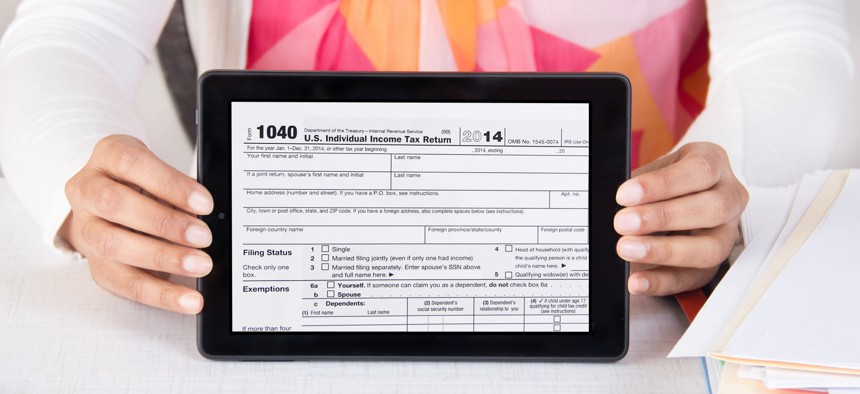'Taxpayer Advocate' pushes for IRS to make its own free, direct e-file system

The National Taxpayer Advocate said in a Jan. 11 report that the IRS should ditch a program using private sector tax prep software in favor of its own software program. pkstock/ Getty Images
A new report calls the current e-file program, a collaboration between private tax prep companies and the IRS, greatly underutilized and advises the agency to develop a new system.
The lead of the independent organization within the IRS charged with advising the agency on taxpayer issues wants it to provide its own free, direct e-file tax return system.
Although it is unclear whether the IRS will act on this recommendation, the move would mark a shift from the status quo.
The endorsement came as part of an annual report on top issues published on Jan. 11 by Erin Collins, National Taxpayer Advocate.
“Most U.S. adults are legally required to file federal income tax returns,” Collins writes in the report. “Taxpayers have a right to expect that this process will be as easy and straightforward as possible, and the IRS has an interest in facilitating it, because the U.S. tax system relies on self-assessment and voluntary compliance for the collection of revenue.”
The agency has an ongoing partnership with seven tax prep companies, including TaxSlayer and FileYourTaxes.com, that dates back to an early 2000’s agreement.
As part of the agreement, commercial tax prep companies make some tax return prep software available to most Americans for free in exchange for the IRS remaining on the sidelines of the competition for business. The provision that the IRS not develop its own service was removed in 2019.
The program, called Free File, is open to 70% of Americans, but is vastly underutilized – in 2022, only 2% of all taxpayers used the program, the new report states.
Congress has also signaled some interest in the IRS moving towards providing its own direct electronic filing system by including a provision that the IRS study the feasibility of such a system in the Inflation Reduction Act passed last year. That report is due to Congress by May 16.
The Treasury Inspector General for Tax Administration pinned low Free File participation rates on program complexity as well as bad oversight in a 2020 report.
The report estimated that for tax year 2019, over 14 million taxpayers who were eligible for Free File may have paid fees to e-file their tax return with software provided by members of the Free File program.
Last May, Intuit agreed to a $141 million settlement to settle claims from all U.S. states and Washington D.C. that TurboTax directed people to buy products even when they were eligible for Free File options.
Collins wrote that “while many taxpayers will continue to use preparers or commercial software, taxpayers should not be required to incur fees to comply with their tax return filing obligations. A free direct e-file tax return system will provide taxpayers with more options.”
The previous National Taxpayer Advocate, Nina Olson, has also previously called out problems with the Free File program, such as companies steering individuals to commercial products and low participation rates. Olson also argued even back in 2004 that the IRS should not extend the Free File agreement and instead provide free software itself.
But this year’s recommendation for the IRS to develop its own free system is cropping up in the annual report for the first time in several years, and for the first time since Collins took the position.
The Government Accountability Office also recommended last year that the IRS look at new options for free online tax filing. The IRS said in that report that it “does not believe” that a public free-file option would “significantly improve the taxpayer experience.”
Several heavy-hitters have left the Free File program in recent years, including Intuit – which runs TurboTax – and H&R Block, factors that put the viability of the program itself at risk, GAO wrote.
The IRS appears to be committed to maintaining the Free File program at least for now, writing in response to recommendations from the National Taxpayer Advocate that the agency “remains focused on working with [Free File Incorporated] and others to continue enhancing and growing the e-file program,” adding that “IRS Free File is well positioned to deliver for the 2023 filing season.”
As for the Treasury Department, Secretary Janet Yellen said in a hearing last June that building its own program is a “priority,” saying that “when the IRS is adequately resourced, it’s something that will happen.”
Collins suggests two options for a more “comprehensive” e-file solution from the IRS.
The first “would allow taxpayers to log into an IRS online account, see all the information returns and wage statements that have been provided by third parties to the IRS, and use that information to e-file directly with the IRS for free,” writes Collins.
The second route, called auto-fill or return-free filing, would have the IRS use the information it already has to estimate taxable income on behalf of taxpayers, who would then make corrections, report additional income and submit returns to the IRS.
Regardless, there are questions about the IRS' capacity to run and manage such a system. The IRS itself pointed to funding issues in comments included in the GAO report.
The IRS did not respond directly to a question from FCW about whether or not it intends to develop its own direct e-file system.
But agency officials did tell FCW in a statement that “the IRS will be carefully reviewing the annual report” and that “we look forward to working with the Advocate and others as we work to transform the IRS; many of the ideas outlined in the report can be possible given the consistent, multi-year funding provided in the Inflation Reduction Act.”



